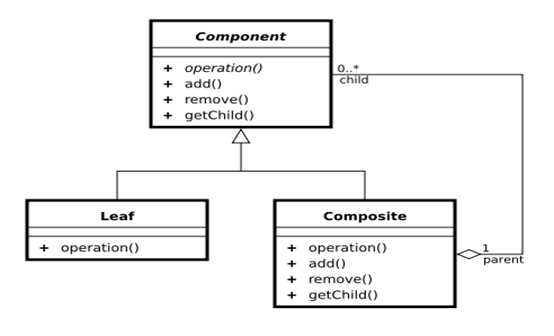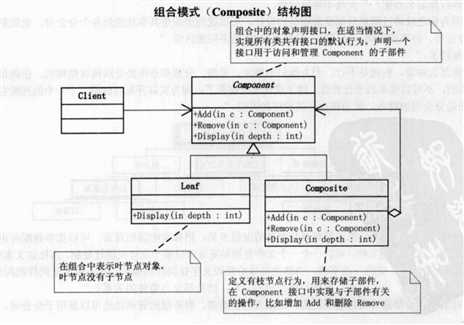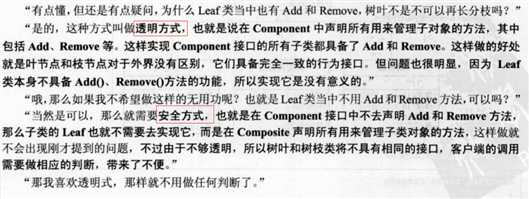标签:.com rtu txt ret 部分 pre virtual 注意 eve
Composite模式也叫组合模式,是构造型的设计模式之一。通过递归手段来构造树形的对象结构,并可以通过一个对象来访问整个对象树。



Component (树形结构的节点抽象)
- 为所有的对象定义统一的接口(公共属性,行为等的定义)
- 提供管理子节点对象的接口方法
- [可选]提供管理父节点对象的接口方法
Leaf (树形结构的叶节点) Component的实现子类
Composite(树形结构的枝节点) Component的实现子类
适用于:
单个对象和组合对象的使用具有一致性。将对象组合成树形结构以表示“部分--整体”



1 #include <iostream> 2 using namespace std; 3 #include "string" 4 #include "list" 5 //Component (树形结构的节点抽象) 6 class IFile 7 { 8 public: 9 virtual void display() = 0; 10 virtual int add(IFile *ifile) = 0; 11 virtual int remove(IFile *ifile) = 0; 12 virtual list<IFile *>* getChild() = 0; 13 }; 14 15 //文件结点 Leaf (树形结构的叶节点) Component的实现子类 16 class File : public IFile 17 { 18 public: 19 File(string name) 20 { 21 m_name = name; 22 } 23 virtual void display() 24 { 25 cout << m_name << endl; 26 } 27 28 virtual int add(IFile *ifile) 29 { 30 return -1; 31 } 32 33 virtual int remove(IFile *ifile) 34 { 35 return -1; 36 } 37 38 virtual list<IFile *>* getChild() 39 { 40 return NULL; 41 } 42 private: 43 string m_name; 44 }; 45 46 //目录 结点 Composite(树形结构的枝节点) Component的实现子类 47 class Dir : public IFile 48 { 49 public: 50 Dir(string name) 51 { 52 m_name = name; 53 m_list = new list<IFile *>; 54 m_list->clear(); 55 } 56 virtual void display() 57 { 58 cout << m_name << endl; 59 } 60 61 virtual int add(IFile *ifile) 62 { 63 m_list->push_back(ifile); 64 return 0; 65 } 66 67 virtual int remove(IFile *ifile) 68 { 69 m_list->remove(ifile); 70 return 0; 71 } 72 73 virtual list<IFile *>* getChild() 74 { 75 return m_list; 76 } 77 private: 78 string m_name; 79 list<IFile *> *m_list; 80 }; 81 82 83 // 递归的显示树 84 void showTree(IFile *root, int level) 85 { 86 int i = 0; 87 if (root == NULL) 88 { 89 return ; 90 } 91 for (i=0; i<level; i++) 92 { 93 printf("\t"); 94 } 95 //1 显示根 结点 96 root->display(); 97 98 //2 若根结点 有孩子 99 //判读孩子是文件,显示名字 ) 100 //判断孩子是目录,showTree(子目录) 101 102 list<IFile *> *mylist = root->getChild(); 103 if (mylist != NULL) //说明是一个目录 104 { 105 for (list<IFile *>::iterator it=mylist->begin(); it!=mylist->end(); it++) 106 { 107 if ( (*it)->getChild() == NULL ) 108 { 109 for (i=0; i<=level; i++) //注意 <= 110 { 111 printf("\t"); 112 } 113 (*it)->display(); 114 } 115 else 116 { 117 showTree(*it, level+1); 118 } 119 } 120 } 121 } 122 123 void main() 124 { 125 Dir *root = new Dir("C"); 126 //root->display(); 127 128 Dir *dir1 = new Dir("111dir"); 129 File *aaafile = new File("aaa.txt"); 130 131 //获取root结点下的 孩子集合 132 list<IFile *> *mylist = root->getChild(); 133 134 root->add(dir1); 135 root->add(aaafile); 136 137 // (111dir) (aaa.txt) 138 // ▲ 139 for ( list<IFile *>::iterator it=mylist->begin(); it!=mylist->end(); it++ ) 140 { 141 (*it)->display(); 142 } 143 144 // 145 Dir *dir222 = new Dir("222dir"); 146 File *bbbfile = new File("bbb.txt"); 147 dir1->add(dir222); 148 dir1->add(bbbfile); 149 150 cout << "通过 showTree 方式 显示 root 结点下的 所有子结点" << endl; 151 152 showTree(root, 0); 153 154 cout<<"hello..."<<endl; 155 system("pause"); 156 return ; 157 }
优点:

10,组合模式(Composite Pattern)是将对象组合成树形结构以表示“部分--整体”的层次结构。使得用户对单个对象和组合对象的使用具有一致性。
标签:.com rtu txt ret 部分 pre virtual 注意 eve
原文地址:http://www.cnblogs.com/D-DZDD/p/7341316.html